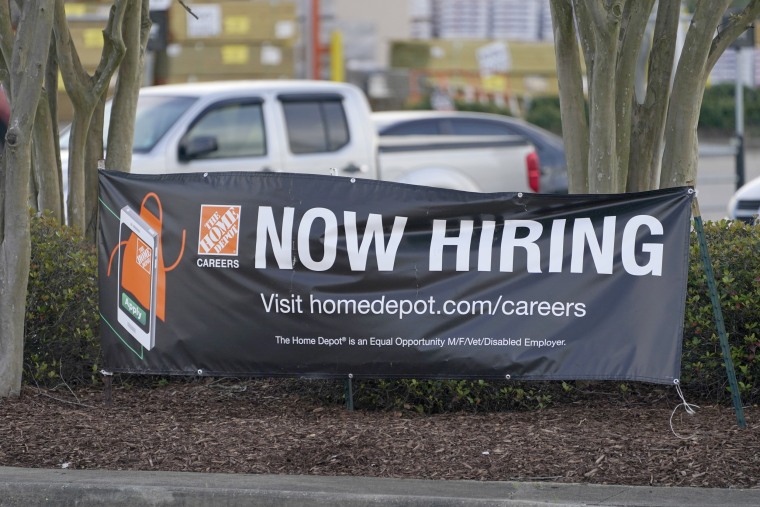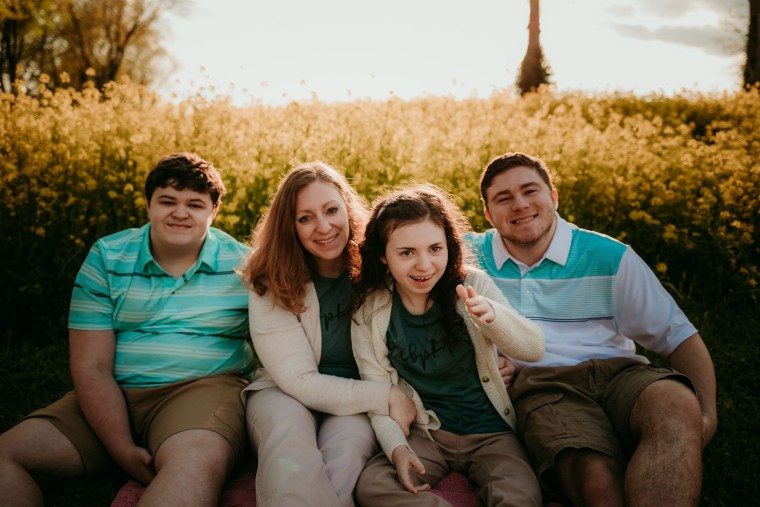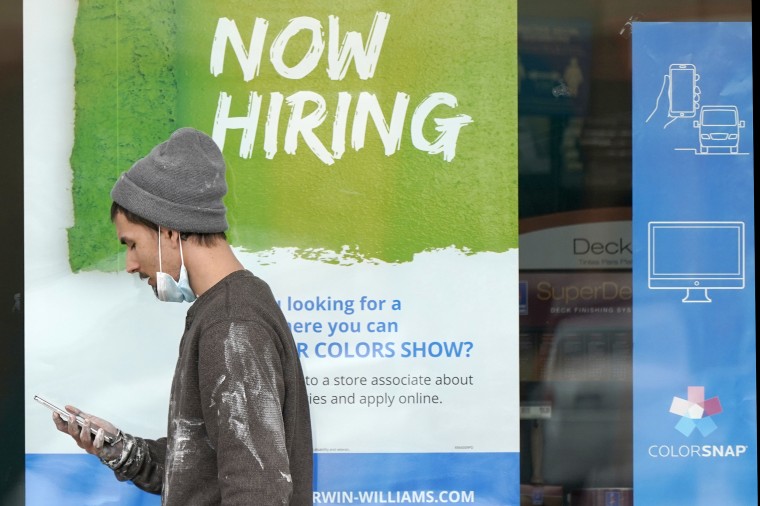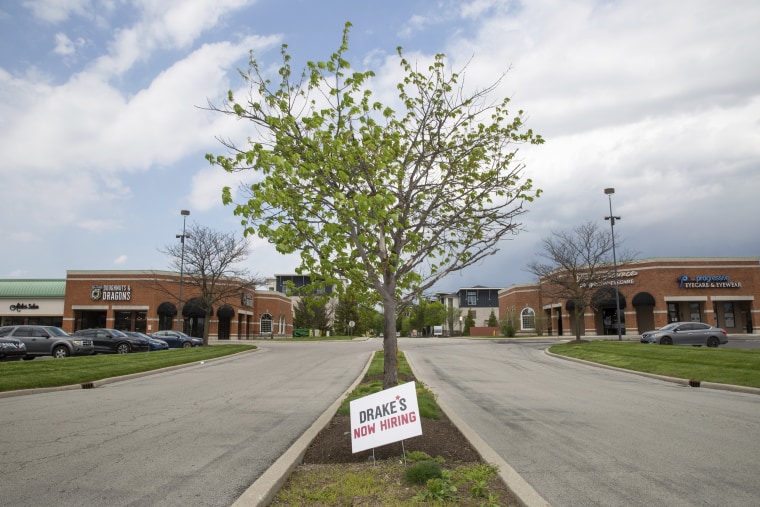JACKSON, Miss. — For Kelvin Wade, 34, the pandemic is far from over.
He recently marked the anniversary of his mother's death from Covid-19, a loss that still feels fresh. He and his wife, D'Anna, 23, who live in Ridgeland, Mississippi, fear for the safety of their 15-month-old daughter, so Wade goes out on errands alone, hoping to reduce the family's exposure.
Despite evidence that the vaccines are extremely safe, the couple is hesitant to get vaccinated, worried that the shots could bring additional risks.
And more than a year after the coronavirus first began shuttering businesses and displacing people from their jobs, both are still out of work.
Kelvin Wade worked as a forklift operator at a warehouse until he lost his job as production slowed in March 2020. D'Anna Wade sensed that layoffs at the department store where she worked would follow, so after her maternity leave, she decided not to return. It didn't make sense, she thought, to expose herself to the virus while waiting on the inevitable.
Kelvin Wade has been reluctant to venture back out into the workforce. The $2,000 in monthly unemployment benefits he receives is less than he made at the warehouse, but he hasn't been able to find another job that pays as much and feels safe. While fast food restaurants are hiring, they pay less and involve more interaction with the public. He'd like to work from home, but he hasn't found any prospects.
"Right now, I don't have a solution," he said.
He may not have much time left to find one.
Next month, Mississippi will begin turning down the federal dollars that have topped off many of the state's unemployment checks, which max out at $235, with an additional $300 in weekly aid. Twelve other Republican-led states have announced similar moves; politicians claim that the extra unemployment funds lead workers to stay home, fueling a significant labor shortage. Critics have increasingly cast unemployment benefits as a lure for recipients drawn to easy money, rather than as a lifeline for those on the margins.

But that doesn't capture the full picture of what's happening in households across the country. In interviews over the past week, economic experts, labor advocates and social service providers said that while people are choosing not to take jobs for many reasons, concern about health and safety has been left out of the conversation. Despite rising vaccination rates, many people don't feel comfortable returning to jobs they see as risky — particularly if they haven't been vaccinated or if they have young children or vulnerable relatives at home.
Gary Burtless, an economist and senior fellow at the Brookings Institution, said that may especially be the case for people who worked in low-paying industries before the pandemic, such as food service and warehousing, as well as those with erratic work schedules, such as hospitality workers and home health aides. A lack of child care — particularly in communities where schools remain closed — is another major factor, he said.
"All those things might make people, especially in low-paid positions, reluctant to take a job and perhaps reduce their family's capacity to pay for its bills," he said. "Why should they make financial sacrifices on behalf of an industry which historically has not paid them very good wages and not offered them very good benefits, and so on?"
But those factors aren't often discussed as government officials grapple with the millions of jobs that are going unfilled as the U.S. struggles to restart its economy. Job openings jumped to a record 8.1 million in March, an increase of nearly 600,000 from February, according to the Labor Department.
Businesses that want to hire say they can't, leading some to pay more to fill open positions. Last week, McDonald's announced that workers at company-owned restaurants would begin taking home higher wages as it tries to fill thousands of openings. The commitment followed similar moves by restaurants such as Chipotle and Olive Garden, which are also boosting pay.
Business groups and Republicans have pointed to the disappointing April jobs report, in which the U.S. gained only 266,000 jobs, even though forecasts predicted that the number would top 1 million, as evidence of a labor shortage caused by the Biden administration's supplemental unemployment benefits.
Constance Hunter, the chief economist at KPMG, one of the Big Four accounting firms, said the full picture is more complicated.
She said health risks associated with the "extremely pernicious and extremely resilient" pandemic, along with other factors, such as child care, are driving the decision-making of those who haven't rejoined the workforce.
"I would say that this is also a reminder, perhaps, that we're not yet out of the woods and that there are people in the labor market who might feel that way," Hunter said.
Jennifer Clatterbuck, a single mother of three in Marietta, Ohio, was working as a physical therapy assistant before she lost her job to the pandemic.
She has been struggling to find work that will support her family and keep her immunocompromised youngest child safe.
"That's a huge concern for me, weighing that risk with whatever job I take on," said Clatterbuck, 39
Emma, 12, has epileptic encephalopathy, a rare disease that gives her seizures, requires that she use a wheelchair and makes her especially vulnerable to severe illness from the coronavirus.
Clatterbuck said that every time she considers a job, she finds herself asking whether it is "really worth the risk to her, because I don't believe that she would survive this virus."
Clatterbuck said she hasn't been vaccinated because her family has a history of severe reactions to vaccinations.

She gets $575 a week in unemployment benefits, less than she would make as a physical therapy assistant but more than she would make at some of the jobs she has seen, which "won't even buy groceries if you have two teenagers in the house." In addition to Emma, Clatterbuck has a 15-year-old and a 17-year-old.
Ohio, where Clatterbuck lives, plans to end the enhanced federal unemployment benefits in late June, Gov. Mike DeWine said last week.
DeWine, a Republican, said that when the additional assistance began, "it was a lifeline for many Americans at a time when the only weapon we had in fighting the virus was to slow its spread through social distancing, masking and sanitization."
"That is no longer the case," he said, adding that the assistance "was always intended to be temporary."
With the change, Clatterbuck worries that she'll have to take a job that could put her family's health at risk and might not pay the bills.
"It's definitely caused me a lot more stress and anxiety," she said.
In Mississippi, worker concerns about Covid-19 safety protocols and the state's low vaccination rate are absent from officials' defense of breaking off from federal unemployment programs.
Hours before Gov. Tate Reeves announced that the benefits were ending, state House Speaker Philip Gunn wrote a letter to Reeves and members of the Legislature sharing an allegation from an unnamed business owner that unemployment recipients were abusing the program and not really trying to find jobs. The correspondence also complained about the overwork of employees "who are doing the right thing and returning to work."
"These businesses are no longer suffering from a lack of demand due to Covid-19. Rather, they are suffering from a labor shortage caused by unemployment benefits that exceed normal wage levels for productive work," he wrote.

After the announcement, Lt. Gov. Delbert Hosemann told the Northeast Mississippi Daily Journal, "It does not seem reasonable to pay a healthy worker not to work."
Oleta Fitzgerald, director of the Southern Regional Office of the Children's Defense Fund, which advocates for children living in poverty, said some unemployed workers with pre-existing conditions are apprehensive about going back to jobs where precautions may not be enforced. Others lack health insurance, further driving hesitation.
"This thing is not simple," Fitzgerald said. "There are people who can't go back to work now."
Debra Thomas, a single mom in Jackson, said a "house full of kids with asthma and bronchitis" has deterred her from going back to her job at a chicken plant in a town about 40 miles away from her home. Slicing strips of meat from birds kept her on her feet for hours. But, she said, the $15-an-hour pay was worth it, and she liked her co-workers.
Thomas left the plant last spring out of fear of the virus, and she doesn't get unemployment benefits. Receiving food assistance, or SNAP benefits, and support from loved ones has helped tide her family over. She has 11 children; six of them, ages 9 to 18, live with her. On occasion, she still talks with her former supervisor about returning but tells her she's not ready.
At times, she has felt like a holdout in a state that is careening toward a return to normal. She isn't comfortable being vaccinated against Covid-19, and she worries about the virus's continuing to shape her life. She is troubled by news reports from India about people dying without access to ventilators. It makes it hard to understand how she can go into stores where only half of the people wear masks.
"They talk about opening the world back up," Thomas said. "People think it's a game."
Hospitalization and daily case numbers have dipped from an early-year peak in Mississippi, but many residents, including Kelvin Wade, are still concerned.
The spread of the virus, Wade said, "may not be like it was at first, but it's still a few laying around, waiting to get in somebody's body."
In the meantime, Wade is bracing for his unemployment checks to drop to $235 a week. One option he is considering is to complete training to become a truck driver. Being on the road, he reasons, would keep him at a distance from others compared to some front-line jobs in the service industry.
Wade was trying to earn his commercial driving license at a trade school when the pandemic brought his training to a halt.
After the governor's announcement, he has started thinking about going back. He is unsure about what he would do if that plan fell through.
"One day at a time," he said.
Bracey Harris reported from Jackson; Daniella Silva reported from New York.


